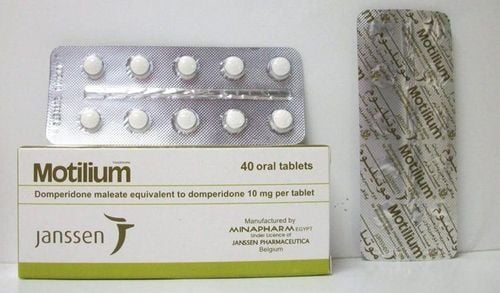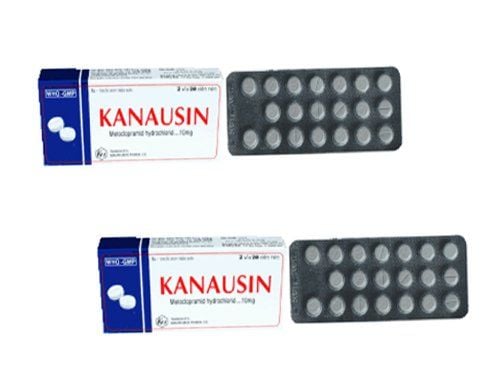This is an automatically translated article.
Vincomid is used to treat or prevent vomiting and nausea. The drug is in the form of injections, which can be administered intramuscularly or intravenously. Find out more information about Vincomid through the article below.
1. What is Vincomid?
The main ingredient of Vincomid is Metoclopramide 10mg/2ml, which is prepared in the form of an injection solution.
Metoclopramide is a substance that blocks receptors, reduces central and peripheral effects of dopamine, makes receptors in the gastrointestinal tract sensitive to Acetylcholine. Metoclopramide's main effects are antiemetic, increase intestinal motility, speed up gastric emptying, thereby avoiding gastroesophageal reflux.
When injected intramuscularly, the drug begins to work after 10 to 15 minutes, when administered intravenously, it is faster after 1-3 minutes.
2. Uses of Vincomid
Thanks to the inhibitory effect on the vomiting center, the drug is indicated in the following cases:
Indication for prophylaxis of vomiting and nausea caused by radiation therapy. Symptomatic treatment of vomiting and nausea, including vomiting and nausea caused by acute migraine.
3. Dosage and usage of Vincomid
How to use: The drug is administered by intramuscular or slow intravenous injection over at least 3 minutes. If injecting more than once, the interval between taking the drug into the body is at least 6 hours, even in case of vomiting or not taking a previous dose to avoid the risk of overdose.
Use this medicine only when prescribed by a doctor and when taking it must be done by qualified medical personnel.
Dosage in adults
Prophylaxis of postoperative nausea and vomiting : The recommended dose is 10 mg. Prophylaxis of vomiting and nausea due to radiation therapy: Recommended dose of 10 mg and used up to 3 times/day. Symptomatic treatment of vomiting and other nausea or vomiting due to acute migraine: A dose of 10 mg is recommended up to 3 times daily. Maximum recommended dose: 30 mg/day or 0.5 mg/kg/day. Duration of treatment: Using Vincomid for the shortest time to bring effective, then you can switch to oral or rectal medicine. Children 1 - 18 years: Vincomid is the 2nd choice for the treatment of vomiting and nausea.
For all indications for the treatment or prevention of vomiting and nausea: A dose of 0.1-0.15 mg/kg and up to 3 times/day is recommended, intravenously. Maximum dose: 0.5 mg/kg/day. Duration of treatment: Prophylaxis of late onset chemotherapy-induced vomiting and nausea is maximum within 5 days. Treat postoperative nausea and vomiting up to 48 hours. Elderly:
Should consider reducing the dose each time based on liver function, kidney and physical condition of the patient. Avoid the risk of an overdose causing mild to severe side effects. Patients with renal impairment:
End stage renal failure (creatinine clearance < 15 ml/min): The daily dose should be reduced to 75%. Severe or moderate renal impairment (creatinine clearance 15-60 ml/min): The usual dose should be reduced by 50%. Patients with hepatic impairment:
Severe liver failure should reduce the dose to 50%. Overdose: Overdose may occur with manifestations including extrapyramidal disorders, lethargy, reduced cognitive ability, confusion, hallucinations, can cause cardiac arrest, very dangerous respiratory arrest.
Treatment of overdose: In case of extrapyramidal disorders, it is necessary to stop metoclopramide and use symptomatic drugs such as benzodiazepines in children, anticholinergics to treat parkinsonism in adults. It is necessary to treat symptomatically and continuously monitor cardiovascular and respiratory functions depending on the patient's condition.
4. When not to use Vincomid
Vincomid is contraindicated in the following cases:
Hypersensitivity to the active ingredient Metoclopramide or any of its ingredients. Gastrointestinal bleeding, mechanical obstruction of the gastrointestinal tract or gastrointestinal perforation due to this drug will increase intestinal motility and may worsen the patient's condition. Adrenal myeloma due to the risk of developing paroxysmal hypertension. History of metoclopramide-associated dyskinesia or sedation-induced dyskinesia. Seizures: With increasing duration and intensity of seizures. Parkinson's. Used in combination with Levodopa or other dopamine agonists. History of methemoglobinemia due to use of Metoclopramide or deficiency of NADH cytochrome b5 reductase. Children under 1 year old: Because this subject has an increased risk of extrapyramidal disorders.
5. Side effects of Vincomid
When using Vincomid, you may experience unwanted effects including:
Common side effects: Diarrhea, drowsiness, lethargy, extrapyramidal disorders, parkinson's syndrome and restless legs syndrome, depression, hypotension, especially intravenous use. Rare side effects: Syncope after injection, acute hypertensive crisis in patients with pheochromocytoma, bradycardia, especially with intravenous preparations, amenorrhea, increased prolactin Blood, lactation, hypersensitivity, dystonia, motor dysfunction, reduced cognitive ability, convulsions are common especially in patients with epilepsy, hallucinations, confusion. Other side effects: Methemoglobinemia, Sulfhemoglobinemia, cardiac arrest, atrioventricular block, sinus rhythm arrest, prolongation of the QT interval on electrocardiogram, torsades de pointes, gynecomastia, anaphylaxis, tardive dyskinesia may not recovery, neuroleptic malignant syndrome. When experiencing side effects of the drug, the patient should stop using it and notify the doctor for timely treatment.
6. Notes when using Vincomid
Inform your doctor about any history of allergy to any cause. Extrapyramidal symptoms may occur when taking the drug, which is more common in children and young people, who use high doses. The drug should be discontinued as soon as signs of extrapyramidal disorders are observed. In most cases, these symptoms disappear completely after stopping the drug. However, in some cases, medication is needed to treat the symptoms. Prolonged treatment with metoclopramide can cause tardive dyskinesia, in many cases irreversible, especially in the elderly. Therefore, treatment with this drug should not be continued for more than 3 months. The drug should be discontinued immediately when signs of tardive dyskinesia appear. Neuroleptic malignant syndrome has been reported with metoclopramide alone as well as in combination with other sedatives. Patients should be discontinued and appropriate treatment instituted as soon as manifestations of neuroleptic malignant syndrome occur. Care should be taken in monitoring patients receiving Metoclopramide, especially in the case of intravenous administration to the elderly, patients with cardiac and electrolyte disturbances, bradycardia, underlying neurological disease, in patients taking other drugs known to prolong the QT interval or drugs that act on the CNS. The drug can cause symptoms such as drowsiness, dizziness, dyskinesia, dystonia, may affect vision, so people who drive and operate machinery need to be cautious. Drugs act on the central nervous system, so the risk of causing many side effects. You need to ask your doctor to know how to recognize the side effects of the drug early. Pregnancy: Because the pharmacological properties of Metoclopramide are similar to those of other sedative drugs, the use of the drug in late pregnancy may increase the risk of the occurrence of the upper extrapyramidal syndrome in the neonate. Therefore, metoclopramide should be avoided in late pregnancy; In cases where medication is required, it is necessary to closely monitor the child's manifestations. Lactation: Metoclopramide is excreted in small amounts into breast milk, but even small amounts breastfed infants are at risk of adverse drug reactions. Therefore, the use of Metoclopramide during lactation is not recommended. Drug Interactions: Interactions may occur with other drugs or food. So you need to tell your doctor about the medicines you are taking.
Because Metoclopramide increases gastrointestinal motility, it can change the absorption of some drugs such as: anticholinergic; central analgesics, morphine derivatives, anti-anxiety drugs, tranquilizers, H1-antihistamines, antidepressants, Clonidine and related drugs; Serotonergic drugs, Digoxin, Cyclosporin, Mivacurium and Suxamethonium. Interactions with fluoxetin and paroxetin increase the degree of influence of metoclopramide in patients. Alcohol: Alcohol in combination with drugs may increase the CNS depressant effects of Metoclopramide. Hopefully through the article you have had the necessary information about Vincomid drugs. To ensure safe and effective medication use, consult a specialist.
Please dial HOTLINE for more information or register for an appointment HERE. Download MyVinmec app to make appointments faster and to manage your bookings easily.













